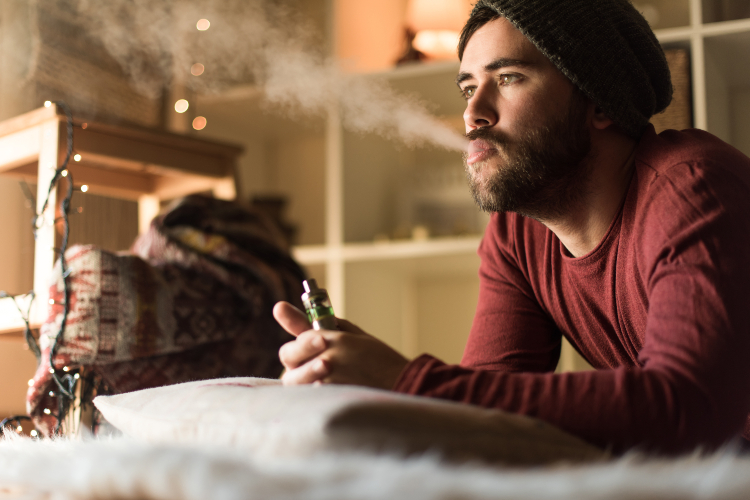Over the last decade, traditional cigarette use has been replaced by vaping. Companies that manufacture and distribute vaping products have carried out a targeted campaign designed to lull customers into a false sense of security. The message was simple: vaping is a healthier alternative to smoking and a GREAT way to destress.
Nothing could be further from the truth.
The ad campaign did its job, especially among younger users. A staggering 29% of children aged 16-18 vape, with 70% of them citing stress relief and relaxation as the reason they started in the first place¹.
In reality, vaping is both harmful and addictive. Despite the advertised message, smoking and anxiety are intimately linked. With that in mind, let’s take a look at whether vaping causes anxiety or reduces it.
The Link Between Stress and Anxiety
Everybody experiences stress and anxiety. They are a part of our normal, everyday life. Factors that contribute to a person’s stress level include:
- Responsibilities
- Obligations
- Worries
- Fears
A good definition of stress is our reaction to external pressure². Anxiety is like stress taken one step further. It is often a reaction to stressful circumstances. Anxiety creates a heightened sense of fear and worry. Sometimes it even sparks a panic attack.
Anxiety’s defining trait is that it doesn’t go away with time, and it isn’t always caused by external stress. Sometimes, it can be its own separate condition.
Whether a person suffers from simple stress or ongoing anxiety, it’s perfectly natural to look for relief. Many people turn to cigarettes and vaping. Despite what tobacco companies say, however, smoking and anxiety are never a good mix.
Anxiety and Nicotine: Perception Versus Reality
Chances are you’ve seen the advertisements showing twenty-somethings vaping to help eliminate stress. These commercials feature a light-hearted atmosphere filled with celebration and positivity.
Commercials like these paint an appealing picture. Unfortunately, they are almost exclusively aimed at young adults and teenagers. That’s not an accident. Here are some important statistics regarding vaping, smoking, and anxiety in people aged 15-24³:
- 4 out of 5 users began vaping as a way to address anxiety and stress
- More than 50% report vaping as necessary to manage their stress level
- 45% found vaping to be a good solution to their stress and anxiety
- 44% understand that vaping doesn’t actually reduce anxiety, however
What does all this mean? Younger smokers find nicotine to be a good coping mechanism when it comes to stress and anxiety. While smoking may appear to decrease signs and symptoms of anxiety, the facts say otherwise.
The Facts About Vaping, Smoking and Anxiety
Cigarette smoke contains more than 7,000 harmful chemicals⁴. When it comes to the smoking versus vaping debate, that’s a huge selling point. The truth, however, is that we have no idea how many harmful chemicals are in vape cartridges.
Another misconception is that nicotine delivered through vape is less addictive. Unfortunately, there is little evidence to support that. Nicotine in ALL its forms is highly addictive⁵.
Here’s the real truth about nicotine, vaping, and anxiety: nicotine is a stimulant that drastically raises your blood pressure AND stimulates your body’s adrenaline production. In other words, nicotine sets the perfect stage for increased anxiety.
Developing Better Ways to Cope
It’s safe to say that vaping does not reduce stress. If anything, vaping causing anxiety is much more accurate. Now that we’ve dispelled all the myths regarding vaping, stress, and anxiety, let’s explore better ways to deal with worry and nervousness⁶.
Just Breathe
When a person feels anxiety and stress creeping up on them, the single best strategy is to take a step back from the situation and breathe. These aren’t just empty words. When a person breathes deeply in a controlled manner they slow down their racing thoughts and emotions. In other words, they short circuit their stress response, while at the same time lowering blood pressure and adrenaline in the bloodstream.
Exercise
The human body was made to move. Engaging in regular physical activity not only boosts your self esteem, it also helps to release key chemicals such as dopamine and serotonin in the brain. These “feel-good” chemicals help put a person’s mind and body into a state of natural relaxation.
Live in the Moment
Anxiety is like an arrow that’s aimed at the future. The power of anxiety propels a person forward whether they like it or not. The best way to counteract that is by practicing mindfulness and living in the moment. Making a conscious commitment not to worry about the future is a great step toward overcoming anxiety.
Maintain Your Personal Health
The mind follows the body. The more a person takes care of their physical health, the healthier their mind will be. Making sure to eat right, stay hydrated, and get plenty of rest nightly can reduce stress and anxiety.
Avoid Alcohol and Caffeine
Alcohol is a depressant. Caffeine is a stimulant. Both may contribute to increased anxiety by altering your blood pressure. To maintain a healthy mind/ body balance, a person should limit their caffeine and alcohol intake as much as possible.
Overcoming Anxiety Without Nicotine
Anxiety can be a difficult condition to deal with. When a panic attack sets in, stress becomes inescapable. While people of all ages have historically turned to nicotine for anxiety relief, the fact of the matter is that vaping, smoking, and nicotine actually increase anxiety. Fortunately, there are a number of holistic methods available to help you deal with your stress level. With time, commitment, and patience, you can treat your anxiety without relying on harmful chemical compounds.
References
- https://www.ncbi.nlm.nih.gov/pmc/articles/PMC7995953/
- https://www.apa.org/topics/stress/anxiety-difference
- https://truthinitiative.org/research-resources/emerging-tobacco-products/colliding-crises-youth-mental-health-and-nicotine-use#:~:text=Overwhelming%20majority%20started%20vaping%20to,between%20ages%2015%20and%2024.
- https://www.hopkinsmedicine.org/health/wellness-and-prevention/5-truths-you-need-to-know-about-vaping#:~:text=1%3A%20Vaping%20is%20less%20harmful,many%20of%20which%20are%20toxic.
- https://www.fda.gov/tobacco-products/health-effects-tobacco-use/nicotine-why-tobacco-products-are-addictive#:~:text=want%20to%20stop.-,What%20Is%20Nicotine%3F,present%20in%20a%20tobacco%20plant.
- https://teen.smokefree.gov/quit-vaping/anxiety-stress-vaping







